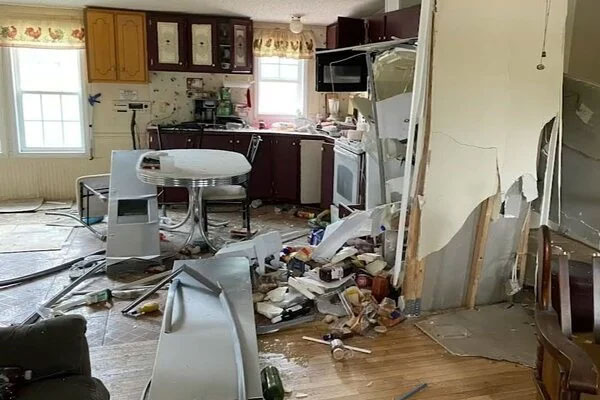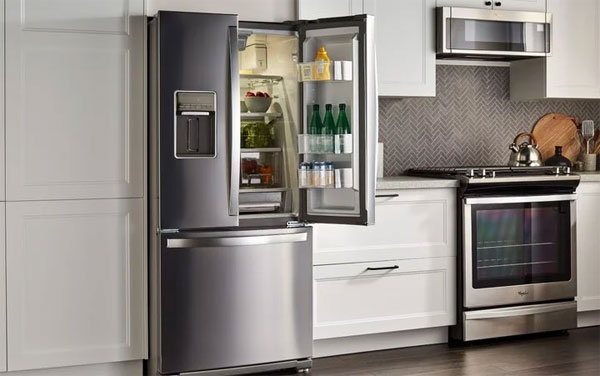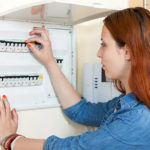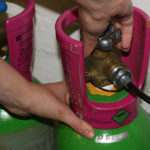Many people are unaware that a refrigerator can also be considered a hazardous appliance. Most electronics give off smoke or sound an alarm before exploding, but a refrigerator can explode suddenly without any warning signs, leaving users defenseless. There have been numerous cases of refrigerators exploding like bombs, causing harm to people and property.
 Lenore Satterthwaite’s kitchen after the refrigerator explosion. (Photo: Cbsnews)
Lenore Satterthwaite’s kitchen after the refrigerator explosion. (Photo: Cbsnews)
In April 2023, an incident occurred in Person County, Carolina (USA). Lenore Satterthwaite was working in the living room when she heard a loud explosion like an earthquake in the kitchen. When she went downstairs, she discovered that her newly purchased refrigerator had blown up, causing large holes in the walls and scattering the refrigerator door and kitchen utensils.
Local police investigated and concluded that the explosion was not caused by a short circuit, but rather a malfunction in the cooling system.
Therefore, to avoid unnecessary risks, let’s explore why refrigerators can explode and take preventive measures to ensure that this accident does not happen in your home.
Why can a refrigerator explode?
A refrigerator explosion is a dangerous situation that can occur if you do not use and store your refrigerator safely. The reasons include:
Gas leakage in the refrigerator
The gas cylinder in the refrigerator is protected by a sturdy casing. However, gas leakage can occur due to improper gas charging or repairs. Gas can escape from weak points, creating a hazardous environment. Gas leakage and contact with ignition sources or heat are the reasons why a refrigerator can explode.
Leakage of refrigerant
After prolonged use, the freezer compartments of many refrigerators often get covered in ice or frost. Many users use hard, sharp objects to pry off this layer of ice, which helps the refrigerator cool better but unintentionally damages the freezer compartment, causing refrigerant leakage and the potential for a refrigerator explosion.
Placing carbonated beverages in the freezer compartment
During hot summer days, many people store carbonated beverages in the freezer compartment to keep them cool. This can lead to a refrigerator explosion.
Carbonated beverages are sealed in cans in an environment below 0°C. Under these conditions, the solubility of CO2 in water changes, and CO2 will start to escape, leading to increased pressure inside the can. When the pressure suddenly increases and exceeds the tolerance of the can, it will explode.
Storing flammable substances in the freezer compartment
Similar to carbonated beverages, storing alcohol, beer, and other flammable substances in the freezer compartment can create a high-pressure environment. Flammable substances contain volatile compounds that can evaporate at low temperatures.
When the pressure inside the freezer compartment suddenly increases, flammable substances can cause a fire or explosion.
 There are many causes of refrigerator explosions. (Photo: whirlpool)
There are many causes of refrigerator explosions. (Photo: whirlpool)
Placing the refrigerator near a heat source
Placing the refrigerator too close to heat sources such as gas stoves, microwaves, and cooking appliances can create a dangerous situation. These devices generate high temperatures during operation and can increase the temperature inside the refrigerator if placed too close. This increases the pressure and can lead to a refrigerator explosion.
An old refrigerator
Old refrigerators have undergone wear and tear over time. Internal components such as compressors, gas cylinders, cooling systems, and other devices may have been damaged or eroded.
If the refrigerator is too old and not properly maintained, the internal pressure can suddenly increase, which is one of the reasons why a refrigerator can explode.
Preventive measures
Most refrigerator explosions occur suddenly, without clear warning signs. To minimize the risk of a refrigerator explosion, you need to choose a suitable location for your refrigerator, avoiding placing it in enclosed spaces, near walls, or in damp areas.
The back of the refrigerator needs ample space for heat dissipation. You also need to keep flammable objects away from the refrigerator and not use sharp objects to defrost the freezer compartment.
In addition, you can pay attention to the sound of the refrigerator. Normally, when the compressor runs, it produces a soft humming sound at a stable high frequency. But if the refrigerator makes an unusually loud noise or worse, no noise at all, it is possible that the refrigerant lines are clogged. In this case, you need to unplug the refrigerator, call a technician to inspect and clean the condenser coils.
If your refrigerator is too old, you should consider replacing it to ensure safe usage.
According to VTC






































